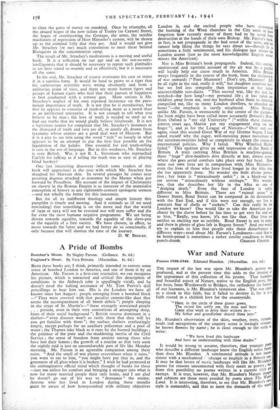A Pride of Bombs
Born these books are, I think, primarily intended to convey some sense of bombed London to America, and one of them is by an American. Mr. Farson is a first-rate journalist; we can recognise his picture, which is unexcited and critical (his description of conditions in the Aldwych tube is appallingly vivid), and he doesn't need the halting assistance of Mr. Tom Purvis's dull pencillings to bear him out. His is the London we have all known since last August: people emerging from a bombed block —" They were covered with that peculiar cement-like dust that seems the accompaniment of all bomb debris "; people sleeping in the crypt of St. Martin's—" these strangely associated people . . . present, even in their very contortions of attempting sleep, hints of their social background "; British reserve dominant in a shelter—" even disaster won't so rattle them that they will let you get familiar with them "; the surface shelters everlastingly empty, except perhaps for an auxiliary policeman and a pool of water ; the Thames inky black as it runs by the burned buildings ; the patience of the poor and the maddening inertia of the Civil Service ; the sense of freedom from anxiety among those who have lost their homes ; the growth of a routine so that very soon the nightly raid is just an uncomfortable part of life like Monday morning. Mr. Parson is an agreeable companion among these ruins. " And the smell of wet plaster everywhere when it rains," you want to say to him, " you might have put that in, and the greenness of all glass when it is broken." I wish he had protested at the unimaginative official mind which thought of bunks for three —just too airless for comfort and bringing a stranger into what is now for many married people their only home, and I am glad he doesn't go out of his way to " denounce " the enemy. Anyone who has lived in London during these months must be aware of how honeycombed with military objectives London is, and the excited people who have denounced the burning of the Wren churches in the City seem to have forgotten how recently many of them had to be saved from destruction at the hands of their own Bishop. Mr. Farson's book, in fact, is not propaganda in the bad sense of the term, and we cannot help liking the things he says about us—though he sometimes a little sentimental, and his dialogue just misses the London accent (just as the most knowledgeable English writer misses the American).
Nor is Miss Brittain's book propaganda. Indeed, this excited, sentimental and egotistic account of the air war by a pacifist will hardly help our cause much in America. Miss Brittain weeps frequently in the course of the book, from the declaration of war onwards (" Poor Mummie! Don't cry, Mummie!
be all right in the end, really it will," her daughter comforts ber), but we feel less sympathy than impatience at her rather uncontrollable tear-ducts. " This second war, like the last, has wrecked—for how long?—my personal life ; it has taken my children away from me, sent my husband after them to America, compelled me, like so many London dwellers, to abandon my home "—the emphasis is surely misplaced. Miss Brittain, unlike Mr. Farson, is strenuously in the centre of the picture_ the book might have been called more accurately Brittain's How. Even Oxford is " my old University " (" within these cloisters, sixteen years ago, Martin put my engagement ring on my finger "), and as for the League of Nations—" Over and over again, since this second Great War of my lifetime began, I have asked myself why the eager, well-meaning peace movement of the nineteen-twenties failed so completely to shape the course of international policies. Why I failed. Why Winifred Holtby failed." This egotism gives an odd impression of-the Battle of Britain. A train carrying Miss Brittain is machine-gunned, three " huge " dive-bombers dive directly at her, almost every- where she goes aerial combats take place over her head. How tame our own lives are in comparison with Miss Brittain's- even the lives of those who have lived longer in the blitz than she has apparently done. No wonder she feels divine protec- tion ; her train is " miraculously unhit " ; in a black-out her car arrives " miraculously without mishaps." No wonder, too, that she describes her life in the blitz as one of " dodging death." Even the face of London is subtly different to Miss Brittain. There are " ruined areas " in Gower Street, Bond Street can be compared in its devastation with the East End, and if this were not enough, we live in constant fear of shells or "rockets." Can this really be the London we know? One would like to take the American pur- chaser by the sleeve before he has time to get very far and say to him, "Really, you know, it's not like that. Our lives are neither so exciting nor so terrible. Bond Street is not in ruins, and there is plenty of glass left in Regent Street." And one would try to explain to him that people take these disturbances in different ways—read about Mr. Farson's Londoners—and that to be bomb-proud is sometimes a rather similar condition to being






























 Previous page
Previous page